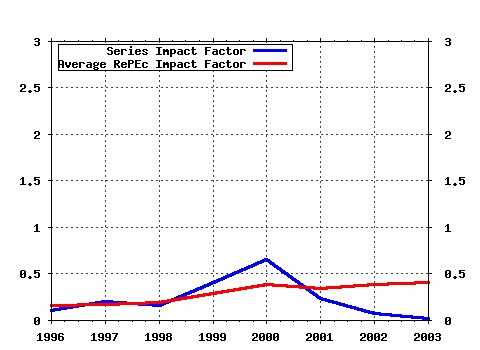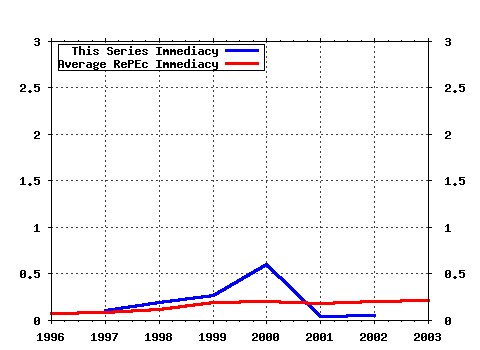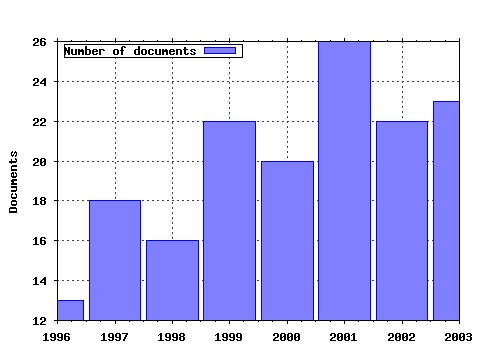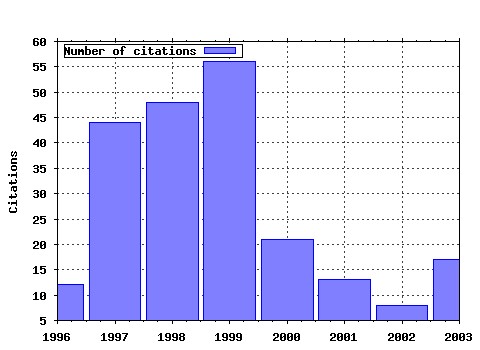
|
|
||||||||||||||||||||||||||||||||||||||||||||||||||||||||||||||||||||||||||||||||||||||||||||||||||||||||||||||||||
International Food Policy Research Institute (IFPRI) / Working papers Raw citation data, Impact Factor, Immediacy Index, Published documents, Citations received, , Most cited papers , Latest citations and documents published in this series in EconPapers.
Most cited documents in this series: (1) RePEc:fpr:fcnddp:68 Early childhood nutrition and academic achievement (1999). International Food Policy Research Institute (IFPRI) / Working papers (2) RePEc:fpr:fcnddp:29 Gender, property rights, and natural resources (1997). International Food Policy Research Institute (IFPRI) / Working papers (3) RePEc:fpr:fcnddp:37 Why do migrants remit? (1997). International Food Policy Research Institute (IFPRI) / Working papers (4) RePEc:fpr:fcnddp:83 Quality or quantity? (2000). International Food Policy Research Institute (IFPRI) / Working papers (5) RePEc:fpr:fcnddp:42 Farm productivity and rural poverty in India (1998). International Food Policy Research Institute (IFPRI) / Working papers (6) RePEc:fpr:fcnddp:9 Gender and poverty (1995). International Food Policy Research Institute (IFPRI) / Working papers (7) RePEc:fpr:fcnddp:50 Computational tools for poverty measurement and analysis (1998). International Food Policy Research Institute (IFPRI) / Working papers (8) RePEc:fpr:fcnddp:168 Long-term consequences of early childhood malnutrition (2003). International Food Policy Research Institute (IFPRI) / Working papers (9) RePEc:fpr:fcnddp:11 Rural finance policies for food security of the poor (1996). International Food Policy Research Institute (IFPRI) / Working papers (10) RePEc:fpr:fcnddp:196 Rural and urban dynamics and poverty: Evidence from China and India (2005). International Food Policy Research Institute (IFPRI) / Working papers (11) RePEc:fpr:fcnddp:49 A profile of poverty in Egypt: 1997 (1998). International Food Policy Research Institute (IFPRI) / Working papers (12) RePEc:fpr:fcnddp:39 Whose education matters in the determination of household income (1997). International Food Policy Research Institute (IFPRI) / Working papers (13) RePEc:fpr:fcnddp:26 Why have some Indian states performed better than others at reducing rural poverty? (1997). International Food Policy Research Institute (IFPRI) / Working papers (14) RePEc:fpr:fcnddp:60 Explaining child malnutrition in developing countries (1999). International Food Policy Research Institute (IFPRI) / Working papers (15) RePEc:fpr:fcnddp:147 Are neighbors equal? (2003). International Food Policy Research Institute (IFPRI) / Working papers (16) RePEc:fpr:fcnddp:44 Can FAOs measure of chronic undernourishment be strengthened? (1998). International Food Policy Research Institute (IFPRI) / Working papers (17) RePEc:fpr:fcnddp:51 Urban challenges to food and nutrition security (1998). International Food Policy Research Institute (IFPRI) / Working papers (18) RePEc:fpr:fcnddp:124 The robustness of poverty profiles reconsidered (2002). International Food Policy Research Institute (IFPRI) / Working papers (19) RePEc:fpr:fcnddp:63 Are urban poverty and undernutrition growing? (1999). International Food Policy Research Institute (IFPRI) / Working papers (20) RePEc:fpr:fcnddp:115 Are women overrepresented among the poor? (2001). International Food Policy Research Institute (IFPRI) / Working papers (21) RePEc:fpr:fcnddp:46 Impact of access to credit on income and food security in Malawi (1998). International Food Policy Research Institute (IFPRI) / Working papers (22) RePEc:fpr:fcnddp:59 Placement and outreach of group-based credit organizations (1999). International Food Policy Research Institute (IFPRI) / Working papers (23) RePEc:fpr:fcnddp:158 Food aid and child nutrition in rural Ethiopia (2003). International Food Policy Research Institute (IFPRI) / Working papers (24) RePEc:fpr:fcnddp:117 An evaluation of the distributional power of PROGRESAs cash transfers in Mexico (2001). International Food Policy Research Institute (IFPRI) / Working papers (25) RePEc:fpr:fcnddp:19 Food security and nutrition implications of intrahousehold bias (1996). International Food Policy Research Institute (IFPRI) / Working papers (26) RePEc:fpr:fcnddp:71 Social capital and income generation in South Africa, 1993-98 (1999). International Food Policy Research Institute (IFPRI) / Working papers (27) RePEc:fpr:fcnddp:203 Early childhood nutrition, schooling, and sibling inequality in a dynamic context: evidence from South Africa (2006). International Food Policy Research Institute (IFPRI) / Working papers (28) RePEc:fpr:fcnddp:118 Is PROGRESA working? (2001). International Food Policy Research Institute (IFPRI) / Working papers (29) RePEc:fpr:fcnddp:10 Womens economic advancement through agricultural change (1996). International Food Policy Research Institute (IFPRI) / Working papers (30) RePEc:fpr:fcnddp:69 Supply response of West African agricultural households (1999). International Food Policy Research Institute (IFPRI) / Working papers (31) RePEc:fpr:fcnddp:48 Human capital, productivity, and labor allocation in rural Pakistan (1998). International Food Policy Research Institute (IFPRI) / Working papers (32) RePEc:fpr:fcnddp:22 Alternative approaches to locating the food insecure (1997). International Food Policy Research Institute (IFPRI) / Working papers (33) RePEc:fpr:fcnddp:6 Gender differentials in farm productivity (1995). International Food Policy Research Institute (IFPRI) / Working papers (34) RePEc:fpr:fcnddp:113 Measuring power (2001). International Food Policy Research Institute (IFPRI) / Working papers (35) RePEc:fpr:fcnddp:45 Does urban agriculture help prevent malnutrition? (1998). International Food Policy Research Institute (IFPRI) / Working papers (36) RePEc:fpr:fcnddp:172 Designing and evaluating social safety nets (2004). International Food Policy Research Institute (IFPRI) / Working papers (37) RePEc:fpr:fcnddp:64 Some urban facts of life (1999). International Food Policy Research Institute (IFPRI) / Working papers (38) RePEc:fpr:fcnddp:192 Poverty, inequality, and geographic targeting (2005). International Food Policy Research Institute (IFPRI) / Working papers (39) RePEc:fpr:fcnddp:79 Adult health in the time of drought (2000). International Food Policy Research Institute (IFPRI) / Working papers (40) RePEc:fpr:fcnddp:150 The impact of Progresa on food consumption (2003). International Food Policy Research Institute (IFPRI) / Working papers (41) RePEc:fpr:fcnddp:190 Social learning, neighborhood effects, and investment in human capital (2005). International Food Policy Research Institute (IFPRI) / Working papers (42) RePEc:fpr:fcnddp:75 Determinants of poverty in Egypt, 1997 (1999). International Food Policy Research Institute (IFPRI) / Working papers (43) RePEc:fpr:fcnddp:139 Can South Africa afford to become Africas first welfare state? (2002). International Food Policy Research Institute (IFPRI) / Working papers (44) RePEc:fpr:fcnddp:204 Nutrition mapping in Tanzania: an exploratory analysis (2006). International Food Policy Research Institute (IFPRI) / Working papers (45) RePEc:fpr:fcnddp:110 Evaluating transfer programs within a general equilibrium framework (2001). International Food Policy Research Institute (IFPRI) / Working papers (46) RePEc:fpr:fcnddp:185 Assets at marriage in rural Ethiopia (2004). International Food Policy Research Institute (IFPRI) / Working papers (47) RePEc:fpr:fcnddp:135 Trust, membership in groups, and household welfare (2002). International Food Policy Research Institute (IFPRI) / Working papers (48) RePEc:fpr:fcnddp:199 Evaluating the cost of poverty alleviation transfer programs (2005). International Food Policy Research Institute (IFPRI) / Working papers (49) RePEc:fpr:fcnddp:93 Mother-father resource control, marriage payments, and girl-boy health in rural Bangladesh (2000). International Food Policy Research Institute (IFPRI) / Working papers (50) RePEc:fpr:fcnddp:109 Does cash crop adoption detract from childcare provision? (2001). International Food Policy Research Institute (IFPRI) / Working papers Latest citations received in: | 2003 | 2002 | 2001 | 2000 Latest citations received in: 2003 Latest citations received in: 2002 (1) RePEc:gco:abcdef:32 Tax-Fiction Story about the State helping the Poor (2002). Grand Coalition Web Site / Grand Coalition Latest citations received in: 2001 (1) RePEc:fpr:tmddps:76 A regional general equilibrium analysis of the welfare impact of cash transfers (2001). International Food Policy Research Institute (IFPRI) / Working papers Latest citations received in: 2000 (1) RePEc:fpr:fcnddp:84 Intrahousehold allocation and gender relations (2000). International Food Policy Research Institute (IFPRI) / Working papers (2) RePEc:fpr:fcnddp:85 Intrahousehold impact of the transfer of modern agricultural technology (2000). International Food Policy Research Institute (IFPRI) / Working papers (3) RePEc:fpr:fcnddp:86 Womens assets and intrahousehold allocation in rural Bangladesh (2000). International Food Policy Research Institute (IFPRI) / Working papers (4) RePEc:fpr:fcnddp:87 Changes in intrahousehold labor allocation to environmental goods collection (2000). International Food Policy Research Institute (IFPRI) / Working papers (5) RePEc:fpr:fcnddp:88 The determinants of employment status in Egypt (2000). International Food Policy Research Institute (IFPRI) / Working papers (6) RePEc:fpr:fcnddp:89 The role of the state in promoting microfinance institutions (2000). International Food Policy Research Institute (IFPRI) / Working papers (7) RePEc:fpr:fcnddp:90 Empirical measurements of households access to credit and credit constraints in developing countries (2000). International Food Policy Research Institute (IFPRI) / Working papers (8) RePEc:fpr:fcnddp:91 Comparing village characteristics derived from rapid appraisals and household surveys (2000). International Food Policy Research Institute (IFPRI) / Working papers (9) RePEc:fpr:fcnddp:93 Mother-father resource control, marriage payments, and girl-boy health in rural Bangladesh (2000). International Food Policy Research Institute (IFPRI) / Working papers (10) RePEc:fpr:fcnddp:94 Targeting urban malnutrition (2000). International Food Policy Research Institute (IFPRI) / Working papers (11) RePEc:fpr:fcnddp:95 Attrition in the Kwazulu Natal income dynamics study, 1993-1998 (2000). International Food Policy Research Institute (IFPRI) / Working papers (12) RePEc:fpr:fcnddp:97 Socio-economic differentials in child stunting are consistently larger in urban than rural areas (2000). International Food Policy Research Institute (IFPRI) / Working papers Warning!! This is still an experimental service. The results of this service should be interpreted with care, especially in research assessment exercises. The processing of documents is automatic. There still are errors and omissions in the identification of references. We are working to improve the software to increase the accuracy of the results. Source data used to compute the impact factor of RePEc series. |



